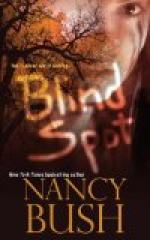He was a psychologist, and up to the day the greatest, perhaps, that we have known. He had a way of going out before his fellows— it is the way of genius—and he had gone far, indeed, before them. If we would trust Dr. Holcomb we have much to live for; our religion is not all hearsay and there is a great deal in science still unthought of. It is an unfortunate case; but there is much to be learned in the circumstance that led the great doctor into the Blind Spot.
I
RHAMDA AVEC
On a certain foggy morning in September, 1905, a tall man wearing a black overcoat and bearing in one hand a small satchel of dark-reddish leather descended from a Geary Street tram at the foot of Market Street, San Francisco. It was a damp morning; a mist was brooding over the city blurring all distinctness.
The man glanced about him; a tall man of trim lines and distinctness and a quick, decided step and bearing. In the shuffle of descending passengers he was outstanding, with a certain inborn grace that without the blood will never come from training. Men noticed and women out of instinct cast curious furtive glances and then turned away; which was natural, inasmuch as the man was plainly old. But for all that many ventured a second glance—and wondered.
An old man with the poise of twenty, a strange face of remarkable features, swarthy, of an Eastern cast, perhaps Indian; whatever the certainty of the man’s age there was still a lingering suggestion of splendid youth. If one persisted in a third or fourth look this suggestion took an almost certain tone, the man’s age dwindled, years dropped from him, and the quizzical smile that played on the lips seemed a foreboding of boyish laughter.
We say foreboding because in this case it is not mistaken diction. Foreboding suggests coming evil; the laughter of boys is wholehearted. It was merely that things were not exactly as they should be; it was not natural that age should be so youthful. The fates were playing, and in this case for once in the world’s history their play was crosswise.
It is a remarkable case from the beginning and we are starting from facts. The man crossed to the window of the Key Route ferry and purchased a ticket for Berkeley, after which, with the throng, he passed the turnstile and on to the boat that was waiting. He took the lower deck, not from choice, apparently, but more because the majority of his fellow passengers, being men, were bound in this direction. The same chance brought him to the cigar-stand. The men about him purchased cigars and cigarettes, and as is the habit of all smokers, strolled off with delighted relish. The man watched them. Had anyone noticed his eyes he would have noted a peculiar colour and a light of surprise. With the prim step that made him so distinctive he advanced to the news-stand.
“Pardon me; but I would like to purchase one of those.” Though he spoke perfect English it was in a strange manner, after the fashion of one who has found something that he has just learned how to use. At the same time he made a suggestion with his tapered fingers indicating the tobacco in the case. The clerk looked up.




